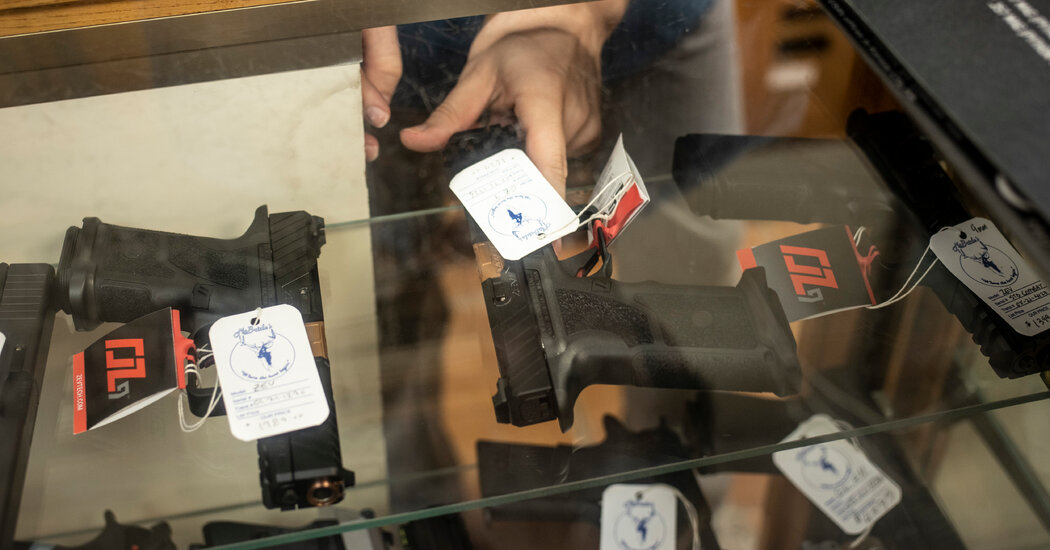Credit Card Sales at Gun Stores Would Be Flagged Under New Code

An organization that sets standards for business transactions has voted to create a special code for gun stores to use when processing credit and debit card transactions, a move long sought by gun control advocates who say it will help law enforcement officials spot suspicious purchases.
The decision by the group, the International Organization for Standardization, or ISO, is likely to set off a political firestorm in Washington and around the country as well as a debate among banks and companies about how and even whether to follow the new standard.
ISO did not respond to a request for comment. But on Friday, Amalgamated Bank, which has helped lead the effort, received a letter, reviewed by The New York Times, confirming the decision.
“This approval is an important step towards improving coordination with law enforcement and preventing gun violence,” said Senator Elizabeth Warren, Democrat of Massachusetts, one of the lawmakers who have been vocal on the issue. “In order for this new merchant code to be maximally effective, every financial institution and payment system needs to step up and put it to use.”
A series of articles in The Times in 2018 identified that the guns used in a majority of the most deadly mass shootings in America had been bought legally with credit cards. None of the purchases were flagged by credit card companies or banks.
Gun Violence in America
- 2022 Mass Shootings: Gun violence is a persistent American problem. A partial list of mass shootings this year offers a glimpse at the scope.
- Spike in Permits: Hundreds of people in New York rushed to get permits to carry concealed handguns in public before a new gun law went into effect in the state, in an effort to avoid the training and paperwork required by the legislation.
- A City Awash in Guns: Alarms have sounded about gun violence across the country over the past two years, but Philadelphia is one of the few major American cities where it truly is as bad as it has ever been.
- Warning Signs: While some mass shootings are committed by people with mental illnesses, experts believe that a life crisis may be a better predictor that a person may become violent.
Virtually every retailing category in the United States has a code that is attached to each credit card transaction — hair salons have one code, for example, while movie theaters have another. But, until now, there was no code for gun stores, often making those transactions indistinguishable within the financial system from those at a retailer that sold fishing rods or tents.
Gun rights advocates say giving gun stores a specific code — known as a Merchant Category Code — could be used to block gun transactions or track gun owners.
Most credit card companies and banks have either fought the new code or been silent on the issue. For several years, Visa and Mastercard have opposed adding the code. Behind the scenes, some company officials favored the code, but they publicly rejected it out of fear of angering politicians who support gun rights.
Amalgamated Bank made an application to ISO for the code this spring, arguing that it was necessary to identify credit risk. It had also applied for the code earlier in the year, but was rejected.
After Amalgamated reapplied for the code, it received support from political leaders across the country. Dozens of senators and members of Congress sent the credit card companies letters supporting the proposal. Several pension funds called for the card companies to disclose whether they supported or had tried to reject the code. It appears the campaign worked.
“We all have to do our part to stop gun violence,” Priscilla Sims Brown, the president and chief executive of Amalgamated Bank, said in a statement on Friday. “The new code will allow us to fully comply with our duty to report suspicious activity and illegal gun sales to authorities without blocking or impeding legal gun sales.”
It is unclear, however, whether the new code will be used.
In a Friday letter to Senator Warren and dozens of other lawmakers, Robert B. Thomson III, a senior vice president of Visa, said the company is not a member of ISO and “does not have authority over ISO’s standards and processes.”
“We believe that asking payment networks to serve as a moral authority by deciding which legal goods can or cannot be purchased sets a dangerous precedent,” he wrote.
A spokesman for Visa did not reply to an email seeking comment.
A spokesman for Mastercard, Seth Eisen, maintained that the company believed that reducing gun violence should be the job of Congress. He said the company would “turn our focus” to how gun sellers and banks would put the new code into effect.
“This is exactly how we would manage the process for any other appropriate M.C.C., like a bicycle shop or sporting goods store,” Mr. Eisen said.
